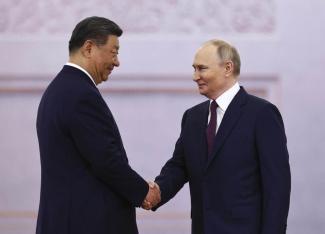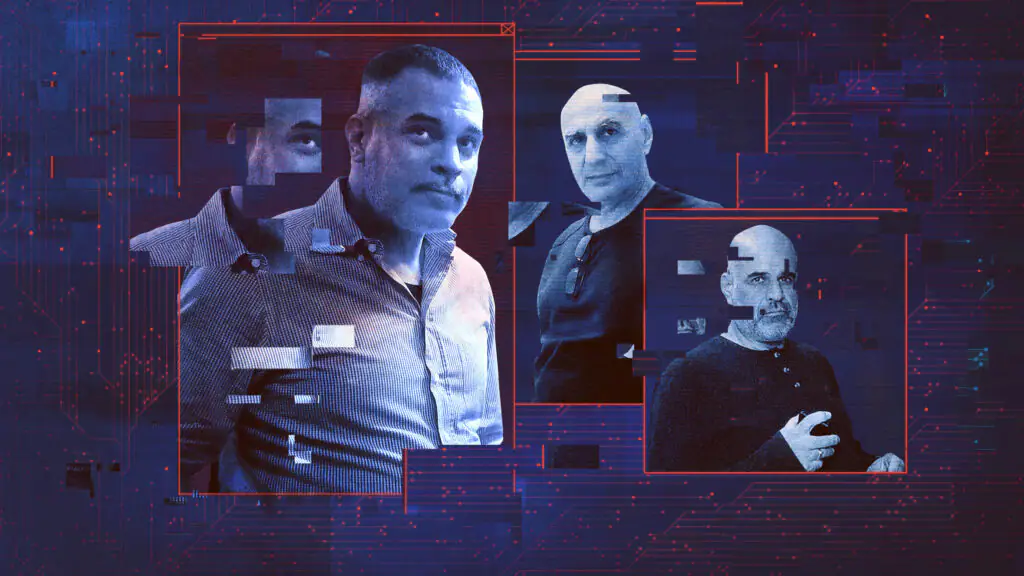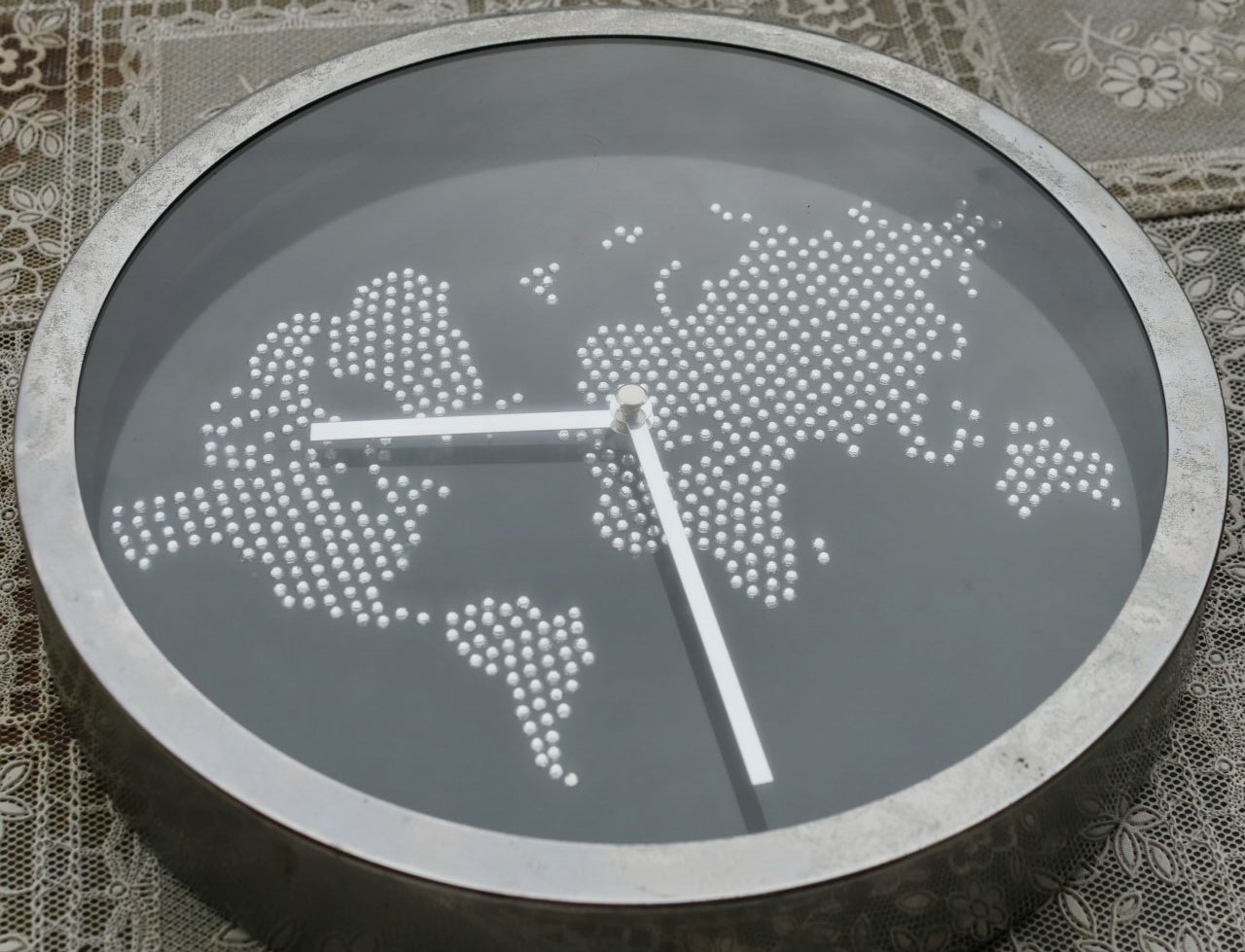Propaganda
When autocrats cooperate against democracy

As different as the autocratic rulers of countries like Russia, China, Iran, North Korea, Venezuela or Zimbabwe may be in terms of orientation and ideology, they stick together to shore up their power, enrich themselves and expand their influence. They cooperate to evade sanctions and support one another with capital, technology, weapons and other resources. Using propaganda bots and troll factories, they influence debates in the digital realm.
What unites them is their contempt for the liberal world and the fight against every form of democracy. That is the conclusion that Polish-US American journalist and historian Anne Applebaum reaches in her book “Autocracy, Inc.”. The rejection of democratic values is rooted in the nature of democracy itself, Applebaum writes: Accountability, transparency, justice, human rights, free media and citizen participation are principles that challenge autocrats’ power. For that reason, they would like to nip democratic movements in the bud whenever possible.
Therefore, they defame the opposition, discredit the charismatic leaders of democratic movements and intimidate their supporters. According to Applebaum, autocrats typically shy away from targeted killings – for fear of creating martyrs.
Digital campaigns and physical violence
Personal attacks against political opponents make an impact. In Venezuela, Zimbabwe and many other countries, they are carried out to make it impossible for inconvenient people to live a productive life. These people are subjected to smear campaigns on social media, harassment by financial authorities, stalking and physical violence. Their family members are often threatened too.
Sophisticated online hate campaigns are giving rise to new forms of mass bullying. Many people participate in such campaigns anonymously. For example, Applebaum describes how the Venezuelan government introduced a system to pay users small sums of money to spread government propaganda on social media. According to Applebaum, similar state-run campaigns are carried out in other autocratic countries as well. They attack opponents using countless real and fake accounts – like an army of trolls that emerge from every nook and cranny, as Venezuelan opposition politician Leopoldo López told Applebaum.
The victims of such troll campaigns suffer so-called civic death: They become increasingly isolated and therefore untouchable – even to their own families. If someone is repeatedly vilified, at some point even those closest to them will ask if there might be something to the accusations – as false as they may be. Autocrats’ message to the people is clear: Stay away from politics. Fighting isn’t worth it.
Discrediting democracies
In addition to surveillance and control, autocrats also create narratives to discredit democracy itself. They oppose the “chaos and violence” that supposedly reign in democracies with the “order and security” in their own countries. They warn the population of the “spiritual contamination of the West” and fuel resentment and nationalist pride. Russia, Applebaum observes, likes to position itself as the leader of an alliance of strong, traditional-minded states opposed to weak democracies.
A massive amount of false information is spread to promote the autocratic narrative. Whether in Putin’s Russia, Maduro’s Venezuela, Museveni’s Uganda or Trump’s America – politicians lie continually and unabashedly, Applebaum documents. If their lies are revealed, they don’t even try to present counterarguments. Their strategy is to flood public discourse with so much disinformation and distraction that it becomes almost impossible to distinguish fact from fiction. Former Trump adviser Steve Bannon coined the phrase “flood the zone with shit” to describe this approach.
Media propaganda
Autocratic leaders invest heavily in foreign media and troll farms to steer the debate in their favour. For example, the Russian broadcaster RT spreads its propaganda on social media and fake websites and operates multiple offices on the African continent. In Nairobi, it employs journalists from the region to broadcast its programming in national and world languages.
Chinese news agencies like Xinhua, the China Global Television Network (CGTN), China Radio and the internet portal China Daily are also generously financed by the state and maintain multiple social media channels, as Applebaum describes. Professionally produced and state subsidised, their content is cheaper than Western offerings and presents China and its allies to their advantage. Hundreds of news providers around the world use this content.
The African offices of Xinhua and RT, along with the Venezuelan satellite broadcaster Telesur and the Iranian network PressTV, spread the autocrats’ worldview through stories and memes. These stories are then picked up and amplified by (real and fake) networks, translated into numerous regional languages and tailored to local markets. The Spanish version of Iran’s PressTV – which is openly antisemitic and presents Covid-19 as the product of a Zionist conspiracy – may be banned in Spain, but it is available everywhere in Latin America. Al-Alam, the Arabic-language version of PressTV, also spreads conspiracy theories, Applebaum writes.
She sums up: We are experiencing a wave of targeted information laundering. Fact checks and quick reactions are not enough; by the time the correction comes, the lie has already made its way into the world.
Influence on Western democracies
Autocrats’ information politics aim to deepen existing divisions worldwide and fuel discontent. They want to whip up anger towards democratic states. Conspiracy theories and fake reports are scattered across innumerable platforms; algorithms help spread them. As a result, these messages become part of the global news.
Autocrats also contact selected politicians and entrepreneurs in democracies to find support. They promote extremist voices to exacerbate conflicts and – whenever possible – escalate them into violence, Applebaum warns. The aim is to encourage citizens to increasingly question politics and the state and sow doubt about democracy itself. Autocrats precisely monitor each other’s victories and defeats and choose actions that will inflict the most damage.
They are also making large-scale efforts to influence elections in democratic countries. Back in 2016, the St. Petersburg-based Internet Research Agency, led by Yevgeny Prigozhin, later the leader of Russia's Wagner group, circulated a massive amount of falsified information to manipulate the American election. Since then, these methods have spread more and more widely.
Uniting against autocrats
Applebaum’s book reveals the influence autocrats now wield in a wide variety of political, economic, military and information spheres. It shows how much damage they can cause when they work together pragmatically to achieve their goal: the destruction of democracy and its values – at home and worldwide.
For Applebaum, the fight for freedom is a fight against autocratic behaviour – across borders in an international alliance. Her book ends with an appeal to democrats to unite.
Book
Applebaum, A., 2024: Autocracy, Inc. The dictators who want to run the world. Random House LLC US.
Dagmar Wolf is D+C’s office manager.
euz.editor@dandc.eu














